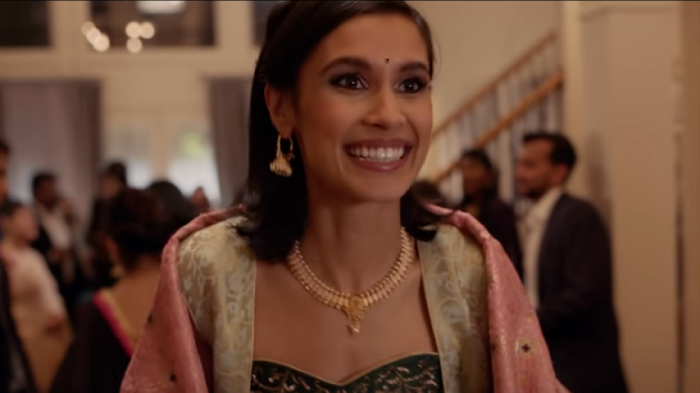You might have partied before, but have you ever been to a party where the guests roll up in hundred-thousand dollar cars and show off the latest sarees and kurtas?
If you haven’t, now’s your chance to live vicariously through the characters of “India Sweets and Spices.” In theaters today, Nov. 19, director Geeta Malik’s coming-of-age tale follows Alia Kapur (Sophia Ali), a college student who returns home to New Jersey for the summer and uncovers long-held family secrets. Over the course of the local community’s luxurious weekly parties, Alia sheds light on buried history and comes to a new understanding of her parents. The film also stars Bollywood legend Manisha Koirala as Alia’s mother Sheila, and “Ms. Marvel”’s Rish Shah as Alia’s love interest Varun.
Before you check out “India Sweets and Spices” in theaters, read our Q&A with Malik and Ali below!
So, Geeta, how did you develop the film? What was your original vision for “India Sweets and Spices?”
Geeta Malik: Originally, this was just supposed to be a really lighthearted, straight comedy poking fun at our community. I started writing the script about 10 years ago, and in 2011 I put it away because I had two kids back-to-back. I didn’t look at it again for another five years, and when I took it out again, I felt like I needed to give the grown-up characters a little bit more depth and really explore what they were like before they had their kids. So there were two generations. I was telling the story of a teen, Alia, and the parents’ generation as well, trying to see how their journeys were parallel to each other.
Can the two of you share how Sophia got involved with the film?
GM: We met at a table read in 2015.
Sophia Ali: The movie was called “Dinner with Friends” at the time. I got reached out to by a casting director that was your friend. I don’t really know the whole story, but they put together a table read and I read for [Alia’s best friend] Neha at the time, and then I think Geeta kept me in mind for it. When the time came that she started filming it, we went and got lunch.
GM: Sophia’s being very humble. At this table read, we had a lot of great actors, and she was reading for the part of the best friend. I couldn’t keep my eyes off her because I thought she was so funny and got the dialogue so well. I was like, ‘She needs to play Alia.’ She was the best person to play this role. When [the film] actually started coming to fruition, I was like, ‘We have to get her in.’ She was at the top of my list. We auditioned a lot of actresses and Sophia just blew everyone away.
Sophia, what did you find most challenging or most exciting about portraying Alia?
SA: I wanted to be as authentic as possible, and that’s always a hard thing to do. You want to be relatable and authentic at the same time, and also honest. Authentic and honest are different in my mind because we’re describing a culture here. The honesty comes with the way that [Alia] exposes the culture. I related to her in that way, and that’s what I was the most excited about, getting to see this wisecracking, sarcastic, above-it-all character that I can relate to so much.
So, what was your favorite scene to film?
GM: My favorite scenes were all the party scenes, especially the final party scene. I won’t spoil anything. But there was always a party atmosphere. It felt very real. We were actually partying, which was really fun. So, I loved doing all of those scenes.
SA: Yeah, my favorite scene to film was probably the last party scene. Or the scene where I get mad at Manisha, who plays my mom, and we all find out she’s a feminist.
What do you guys hope that specifically South Asian American audiences are able to take away from viewing this film?
GM: I really hope that they feel seen. I hope that they feel heard. I hope that they feel, like Soph was saying, that this is an authentic representation of what a lot of us experience. I also know that South Asians are not a monolith. There’s a million experiences. Some people won’t have experienced this kind of thing, but I do hope they can at least look at the cultural aspects of this movie and relate to that, and understand the themes are universal. Perhaps they have aunties and uncles that they’ve given short shrift to, and they should learn their stories as well. That’s the hope.
SA: I had fears, like, ‘I hope they don’t hate that we exposed them like this.’ This is definitely going to be something that people relate to, that South Asians will relate to when they watch it. What comes to mind the most is my family. I grew up next to my aunts and uncles and we lived in a little cul-de-sac in Texas. I kept thinking about them when I was filming it. I just want to do them justice. I want them to watch it and be proud of me—actually, not even of me, of themselves. I want them to be proud of themselves and their own culture.








